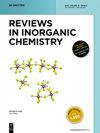Metal-Organic Frameworks as bio- and heterogeneous catalyst supports for biodiesel production
IF 3.1
3区 化学
Q1 CHEMISTRY, INORGANIC & NUCLEAR
引用次数: 1
Abstract
Abstract As biodiesel (BD)/Fatty Acid Alkyl Esters (FAAE) is derived from vegetable oils and animal fats, it is a cost-effective alternative fuel that could complement diesel. The BD is processed from different catalytic routes of esterification and transesterification through homogeneous (alkaline and acid), heterogeneous and enzymatic catalysis. However, heterogeneous catalysts and biocatalysts play an essential role towards a sustainable alternative to homogeneous catalysts applied in biodiesel production. The main drawback is the supporting material. To overcome this, currently, Metal-Organic Frameworks (MOFs) have gained significant interest as supports for catalysts due to their extremely high surface area and numerous binding sites. This review focuses on the advantages of using various MOFs structures as supports for heterogeneous catalysts and biocatalysts for the eco-friendly biodiesel production process. The characteristics of these materials and their fabrication synthesis are briefly discussed. Moreover, we address in a general way basic items ranging from biodiesel synthesis to applied catalysts, giving great importance to the enzymatic part, mainly to the catalytic mechanism in esterification/transesterification reactions. We provide a summary with recommendations based on the limiting factors.金属有机框架作为生物柴油生产的生物和多相催化剂支持
生物柴油(BD)/脂肪酸烷基酯(FAAE)是从植物油和动物脂肪中提取的,是一种经济有效的柴油替代燃料。BD通过均相(碱性和酸性)、多相和酶催化等不同的酯化和酯交换催化途径进行加工。然而,多相催化剂和生物催化剂对生物柴油生产中均相催化剂的可持续替代品起着至关重要的作用。主要的缺点是支撑材料。为了克服这一问题,目前,金属有机框架(mof)由于其极高的表面积和众多的结合位点而成为催化剂的载体,引起了人们的极大兴趣。本文综述了不同mof结构作为多相催化剂和生物催化剂在生态生物柴油生产过程中的优势。简要讨论了这些材料的特点及其制备方法。此外,我们从生物柴油的合成到应用催化剂的基本问题进行了一般性的讨论,其中非常重视酶的部分,主要是酯化/酯交换反应的催化机理。我们提供了一个总结,并根据限制因素提出了建议。
本文章由计算机程序翻译,如有差异,请以英文原文为准。
求助全文
约1分钟内获得全文
求助全文
来源期刊

Reviews in Inorganic Chemistry
化学-分析化学
CiteScore
7.30
自引率
4.90%
发文量
20
审稿时长
1 months
期刊介绍:
Reviews in Inorganic Chemistry (REVIC) is a quarterly, peer-reviewed journal that focuses on developments in inorganic chemistry. Technical reviews offer detailed synthesis protocols, reviews of methodology and descriptions of apparatus. Topics are treated from a synthetic, theoretical, or analytical perspective. The editors and the publisher are committed to high quality standards and rapid handling of the review and publication process. The journal publishes all aspects of solid-state, molecular and surface chemistry. Topics may be treated from a synthetic, theoretical, or analytical perspective. The editors and the publisher are commited to high quality standards and rapid handling of the review and publication process.
Topics:
-Main group chemistry-
Transition metal chemistry-
Coordination chemistry-
Organometallic chemistry-
Catalysis-
Bioinorganic chemistry-
Supramolecular chemistry-
Ionic liquids
 求助内容:
求助内容: 应助结果提醒方式:
应助结果提醒方式:


